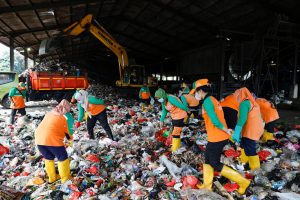THE DEPARTMENT of Energy (DoE) is looking to grant incentives for pioneering waste-to-energy (WTE) projects, including exemptions from the competitive selection process (CSP) and priority dispatch on the spot market.
In a draft circular, the DoE is proposing that pioneer WTE projects be exempt from CSP regardless of capacity. The CSP policy requires distribution utilities to procure power through a transparent and competitive bidding process at a least-cost basis.
Pioneer WTE projects are also under consideration for priority dispatch in the Wholesale Electricity Spot Market (WESM), the trading floor where power distributors procure their supply when their long-term power supply deals are not sufficient to meet their requirements.
Under the proposal, a WTE developer may choose to incentives schemes under either the Renewable Energy Act, which provides sector-specific incentives, or under the CREATE MORE Act (Corporate Recovery and Tax Incentives for Enterprises to Maximize Opportunities for Reinvigorating the Economy Act), which provides broader and more flexible incentives.
The government is also tasked with ensuring that the pioneer WTE project with off-take arrangements under the Green Energy Auction Program has sufficient feedstock through deals with highly urbanized cities (HUCs), local government units, or other government entities.
The Energy Regulatory Commission will be tasked with formulating the price-setting scheme that will establish the tariff range for electricity generated from WTE facilities.
Meanwhile, the transmission network provider and system operator will have to coordinate with the developer in the course of planning, construction, grid connection, and operational integration.
“The integration of WTE in the power generation mix represents a strategic approach to addressing the dual challenges of growing energy demand and increasing solid waste generation,” the DoE said.
WTE is the process of converting non-recyclable waste materials into usable heat, electricity, or fuel using various technologies.
To be qualified as pioneer WTE projects, the facility must be constructed and installed not later than 2027.
Earlier this month, the DoE announced that it will conduct a special auction round in January designed for WTE projects that will source their waste feedstock within Metro Manila and HUCs.
There will also be a succeeding auction round for biomass and WTE technologies by the second quarter of 2026.
The DoE views WTE project development as one of the strategies to address solid waste management while also mitigating floods and providing a supply of “clean energy.” — Sheldeen Joy Talavera
